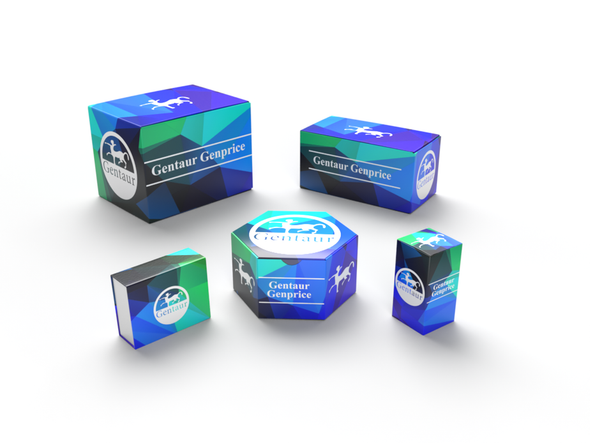Description
TAG-72 Antibody [SPM536] | 34-104 | Gentaur UK, US & Europe Distribution
Host: Mouse
Reactivity: Human, Bovine, Dog, Rat
Homology: N/A
Immunogen: Purified TAG-72 protein was used as the immunogen for this TAG-72 antibody.
Research Area: Cancer, Signal Transduction
Tested Application: Flow, IF, IHC
Application: Flow Cytometry: 0.5-1 ug/million cells in 0.1ml
Immunofluorescence: 1-2 ug/ml
Immunohistochemistry (FFPE) : 0.5-1 ug/ml for 30 minutes at RT (1)
Prediluted format: incubate for 30 min at RT (2)
The optimal dilution of the TAG-72 antibody for each application should be determined by the researcher.
1. Staining of formalin-fixed tissues requires boiling tissue sections in 10mM citrate buffer, pH 6.0, for 10-20 min followed by cooling at RT for 20 minutes.
2. The prediluted format is supplied in a dropper bottle and is optimized for use in IHC. After epitope retrieval step (if required) , drip mAb solution onto the tissue section and incubate at RT for 30 min.
Specificiy: N/A
Positive Control 1: N/A
Positive Control 2: N/A
Positive Control 3: N/A
Positive Control 4: N/A
Positive Control 5: N/A
Positive Control 6: N/A
Molecular Weight: N/A
Validation: N/A
Isoform: N/A
Purification: Protein G affinity chromatography
Clonality: Monoclonal
Clone: SPM536
Isotype: IgG1, kappa
Conjugate: Unconjugated
Physical State: Liquid
Buffer: PBS with 0.1 mg/ml BSA and 0.05% sodium azide
Concentration: 0.2 mg/mL
Storage Condition: Aliquot and Store at 2-8˚C. Avoid freez-thaw cycles.
Alternate Name: N/A
User Note: Optimal dilutions for each application to be determined by the researcher
BACKGROUND: Recognizes an oncofetal antigen of 220kDa, identified as a tumor-associated glycoprotein (TAG-72) with properties of a mucin. This mAb defines the mucin-carried sialylated-Tn epitope. TAG72 is usually expressed by adenocarcinomas, but is negative in mesotheliomas. Studies have reported that this antibody has 80% sensitivity and 93% specificity for pulmonary adenocarcinoma. Therefore, TAG72 is a useful marker to distinguish between mesothelioma and adenocarcinoma. However, false positive reactions can occur so results must be interpreted with the utmost caution. This antibody may be useful in the differentiation of non-small cell carcinomas from small cell carcinomas of the lung. The combined use of anti-TAG72 and anti-GCDFP-15 is valuable in the diagnosis of apocrine carcinoma.

![TAG-72 Antibody [SPM536] TAG-72 Antibody [SPM536]](https://cdn11.bigcommerce.com/s-1rdwiq712m/images/stencil/608x608/products/484296/490125/gentaur-genprice__26005.1661610467__29809.1661628092__75433.1661676199__77988.1661684280__64362.1661692443__02085.1662049603__45075.1662119302__91744.1662191540__21580.1662291419__01118.1663498848.png?c=1)
![TAG-72 Antibody [SPM148] TAG-72 Antibody [SPM148]](https://cdn11.bigcommerce.com/s-1rdwiq712m/images/stencil/590x590/products/484295/490124/gentaur-genprice__26005.1661610467__29809.1661628092__75433.1661676199__77988.1661684280__64362.1661692443__02085.1662049603__45075.1662119302__91744.1662191540__21580.1662291419__90978.1663498848.png?c=1)



![TAG-72 Antibody [CC49] TAG-72 Antibody [CC49]](https://cdn11.bigcommerce.com/s-1rdwiq712m/images/stencil/590x590/products/483817/489646/gentaur-genprice__26005.1661610467__29809.1661628092__75433.1661676199__77988.1661684280__64362.1661692443__02085.1662049603__45075.1662119302__91744.1662191540__21580.1662291419__75637.1663498772.png?c=1)
![TAG-72 Antibody [B72.3] TAG-72 Antibody [B72.3]](https://cdn11.bigcommerce.com/s-1rdwiq712m/images/stencil/590x590/products/483537/489366/gentaur-genprice__26005.1661610467__29809.1661628092__75433.1661676199__77988.1661684280__64362.1661692443__02085.1662049603__45075.1662119302__91744.1662191540__21580.1662291419__75891.1663498729.png?c=1)

![TAG-72 Antibody [CA72/733] TAG-72 Antibody [CA72/733]](https://cdn11.bigcommerce.com/s-1rdwiq712m/images/stencil/590x590/products/483538/489367/gentaur-genprice__26005.1661610467__29809.1661628092__75433.1661676199__77988.1661684280__64362.1661692443__02085.1662049603__45075.1662119302__91744.1662191540__21580.1662291419__76833.1663498729.png?c=1)
![TAG-72 Antibody [TAGP-4] TAG-72 Antibody [TAGP-4]](https://cdn11.bigcommerce.com/s-1rdwiq712m/images/stencil/590x590/products/484114/489943/gentaur-genprice__26005.1661610467__29809.1661628092__75433.1661676199__77988.1661684280__64362.1661692443__02085.1662049603__45075.1662119302__91744.1662191540__21580.1662291419__40516.1663498819.png?c=1)